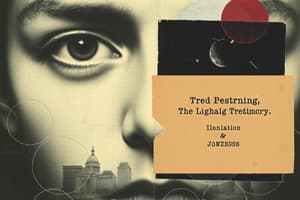Podcast
Questions and Answers
What does the concept of reconstructive memory emphasize in the process of recalling events?
What does the concept of reconstructive memory emphasize in the process of recalling events?
- The exact replication of past experiences
- The ability to remember every detail of an event accurately
- The influence of general knowledge and expectations on recall (correct)
- The retention of factual information without errors
What phenomenon do students typically demonstrate when they miss stimuli that are in plain sight due to focused attention?
What phenomenon do students typically demonstrate when they miss stimuli that are in plain sight due to focused attention?
- Attentional blindness (correct)
- Change blindness
- Weapon focus
- Reconstructive memory
What advantage does memory for schema-consistent objects provide in recall according to Brewer & Treyens (1981)?
What advantage does memory for schema-consistent objects provide in recall according to Brewer & Treyens (1981)?
- Improved accuracy for all objects
- Enhanced recall through rote memorization
- Better memory for inconsistent details
- Higher recall and recognition of schema consistent items (correct)
In the context of eyewitness memory, what is the 'weapon focus' effect?
In the context of eyewitness memory, what is the 'weapon focus' effect?
What is the primary distinction between episodic and semantic memory?
What is the primary distinction between episodic and semantic memory?
How do schemas operate according to Bartlett's concept of memory?
How do schemas operate according to Bartlett's concept of memory?
What was found regarding the presentation of warnings before recall in the DRM paradigm?
What was found regarding the presentation of warnings before recall in the DRM paradigm?
What effect do expectations have on memory recall according to Bartlett?
What effect do expectations have on memory recall according to Bartlett?
Which term describes the memory of skills and classical conditioning effects?
Which term describes the memory of skills and classical conditioning effects?
What did the study by Loftus et al. reveal about eyewitness memory when a weapon is involved?
What did the study by Loftus et al. reveal about eyewitness memory when a weapon is involved?
What did the study by Tuckey & Brewer (2003) suggest regarding recall of a bank robbery?
What did the study by Tuckey & Brewer (2003) suggest regarding recall of a bank robbery?
What is the effect of verbal suggestions on eyewitness memory, as shown in Loftus & Zanni (1975)?
What is the effect of verbal suggestions on eyewitness memory, as shown in Loftus & Zanni (1975)?
What do Deffenbacher et al (2004) suggest about anxiety and stress during encoding?
What do Deffenbacher et al (2004) suggest about anxiety and stress during encoding?
What are the implications of the Innocence Project's best practices for eyewitness identification?
What are the implications of the Innocence Project's best practices for eyewitness identification?
What does the term 'unconscious transference' refer to in eyewitness memory?
What does the term 'unconscious transference' refer to in eyewitness memory?
What did the findings regarding children's eyewitness testimony indicate?
What did the findings regarding children's eyewitness testimony indicate?
How does the distinction between familiarity and recollection contribute to eyewitness memory understanding?
How does the distinction between familiarity and recollection contribute to eyewitness memory understanding?
What was a significant finding from Yuille & Cutshall (1986) regarding real-life crime witnesses?
What was a significant finding from Yuille & Cutshall (1986) regarding real-life crime witnesses?
What did the study conducted by Schwabe & Wolf (2010) reveal about stress and memory learning?
What did the study conducted by Schwabe & Wolf (2010) reveal about stress and memory learning?
Which statement accurately reflects the findings on misinformation's effect on eyewitness memory?
Which statement accurately reflects the findings on misinformation's effect on eyewitness memory?
Flashcards
Reconstructive Memory
Reconstructive Memory
Memory is not a perfect recording, but rather a reconstruction of events based on existing knowledge and inferences.
Weapon Focus
Weapon Focus
Eyewitnesses often focus on a weapon, neglecting other details of a crime scene.
Schema
Schema
Mental framework of knowledge about people, places, events, and actions.
Episodic Memory
Episodic Memory
Signup and view all the flashcards
Semantic Memory
Semantic Memory
Signup and view all the flashcards
Procedural Memory
Procedural Memory
Signup and view all the flashcards
Change Blindness
Change Blindness
Signup and view all the flashcards
DRM Paradigm
DRM Paradigm
Signup and view all the flashcards
Bartlett's Effort After Meaning
Bartlett's Effort After Meaning
Signup and view all the flashcards
Confirmation Bias
Confirmation Bias
Signup and view all the flashcards
Eyewitness Testimony Fragility
Eyewitness Testimony Fragility
Signup and view all the flashcards
Misinformation Acceptance
Misinformation Acceptance
Signup and view all the flashcards
Suggestibility Effect
Suggestibility Effect
Signup and view all the flashcards
False Memories
False Memories
Signup and view all the flashcards
Children's Suggestibility
Children's Suggestibility
Signup and view all the flashcards
Cognitive Interview
Cognitive Interview
Signup and view all the flashcards
Source Misattribution
Source Misattribution
Signup and view all the flashcards
Unconscious Transference
Unconscious Transference
Signup and view all the flashcards
Eyewitness Identification Errors
Eyewitness Identification Errors
Signup and view all the flashcards
Improving Eyewitness Identifications
Improving Eyewitness Identifications
Signup and view all the flashcards
Study Notes
Reconstructive Memory
- Memory is not a passive recording, but a reconstruction.
- Inferences are made during encoding.
- Information and perspective during retrieval are affected by general knowledge and expectations.
- Assumptions and inferences shape memory.
Attentional Blindness and Change Blindness
- Attentional blindness: We miss things in plain sight.
- Change blindness: Changes missed during interruptions in viewing or attention.
- Mack and Rock (1998) studied these phenomena.
Eyewitness Memory
- Weapon Focus: Eyewitnesses prioritize the weapon (focus on crucial aspects), potentially overlooking critical details.
- Loftus et al (1987): Cheques or guns - gun condition details were more powerful.
- Loftus (1979): Overhearing an incident with a pen or knife. Identification rates varied.
- Pickle (1999): Manipulating settings and items affected identification. The effect of an "unexpected" item influenced identification.
Long-Term Memory (LTM)
- Procedural Memory: Stores skills (motor and cognitive). Includes classical conditioning.
- Declarative Memory: Stores facts and personally experienced events.
- Episodic Memory: Personally experienced events, stored with time and place context.
- Semantic Memory: General knowledge, independent of time and place.
DRM Paradigm
- A list of words associated with a critical lure. (Deese 1959, Roediger & McDermott 1995).
- Participants falsely recall lures after studying words.
- Warnings before recall don't reduce false memories.
- Warnings before studying the list do reduce false memories.
- Some false memory effect happens during encoding.
Bartlett (1932)
- Studied errors in recalling complex stories.
- Examined the role of meaning and organization in memory encoding and retrieval.
- "Effort after meaning": Individuals actively strive to make sense of learned material.
- Schemas are key: Long-term knowledge structures used to understand new information.
Schemas
- Schemas are cognitive frameworks composed of knowledge about the world, events, people, actions etc.
Schema in Everyday Life
- Brewer & Treyens (1981): Study participants in a room. Schema consistent objects were recalled and recognised more frequently. Schema inconsistent objects were recalled less accurately.
- Participants falsely recalled objects based on schemas.
- Schema-consistent items were falsely recalled more often.
Schemas and Confirmation Bias
- Bartlett (1932): Memory distortions influenced by expectations (schema effect).
- Tuckey & Brewer (2003): Bank robbery recall contained information consistent with a bank robbery schema.
- Ambiguous conditions can reveal schemas (e.g., gender of masked robber).
Effects during Encoding
- Anxiety: Pickel (1999) -No threat effect on accuracy (experimental). Yuille & Cutshall (1986) - real life. Schwabe & Wolf (2010) - stress test and word list learning. Deffenbacher et al (2004) - real life studies show lower anxiety/stress is more accurate. Marr et al (2020) disagreements on effects.
- Reduced Attention: Encoding accuracy suffers with reduced attention.
Information After the Event
- Loftus & Palmer (1974): Eyewitness testimony is fragile. Words used in questions change recall. Misinformation acceptance increases over time.
- Loftus & Zanni (1975): Word choice influences memory (e.g., "frequent" vs. "occasional" headaches).
False Memories
- Loftus: False memories can be planted in participants (e.g., 25% of participants).
Children as Eyewitnesses
- Children are suggestible, leading to errors (Bruck & Ceci 1997)
- Interview methods: Neutral questioning, context reinstatement, drawings, repeated testing.
Familiarity vs. Recollection
- Tulving (1985): Distinction between knowing and remembering.
- Familiarity (fast, automatic): Knowing something.
- Recollection (slow, attention demanding): Remembering something.
Misattribution and Transference
- Source misattribution: Failing to distinguish between memory sources.
- Unconscious transference: Incorrect identification based on familiarity.
Eyewitness Identification
- Eyewitness identification is poor. Improved with sequential lineups, warnings that the culprit may not be present, etc..
The Innocence Project
- Best practices for eyewitness identification: Double-blind administration, proper lineups, instructions to the witness, recording the procedure.
The Cognitive Interview
- Interview method to recreate context, report everything.
Existing Influences on Identification
- Face recognition is difficult for unfamiliar faces.
- Accuracy higher with own race/group.
- Ingroup benefit may be based on economic factors.
Belief in Eyewitness Testimony
- Some caution in relying solely on eyewitness testimony (e.g. 23% of judges).
Laboratory vs. Courtroom
- Laboratory findings may overstate or underestimate errors.
- Jurors being informed of research findings has effects.
Studying That Suits You
Use AI to generate personalized quizzes and flashcards to suit your learning preferences.




